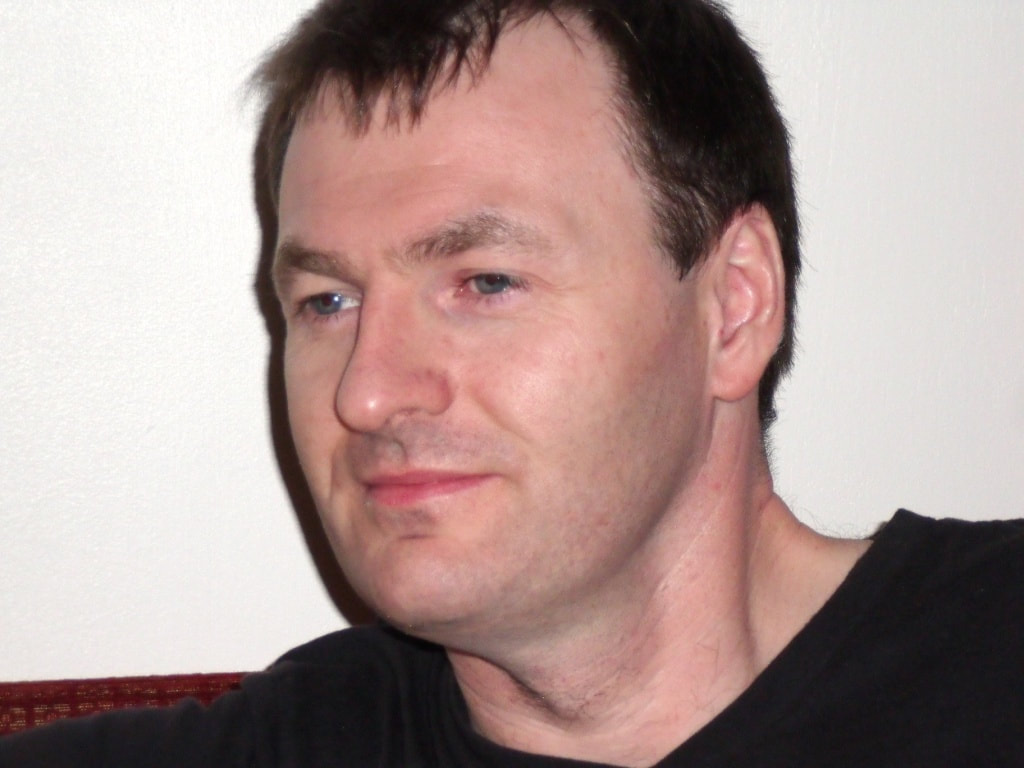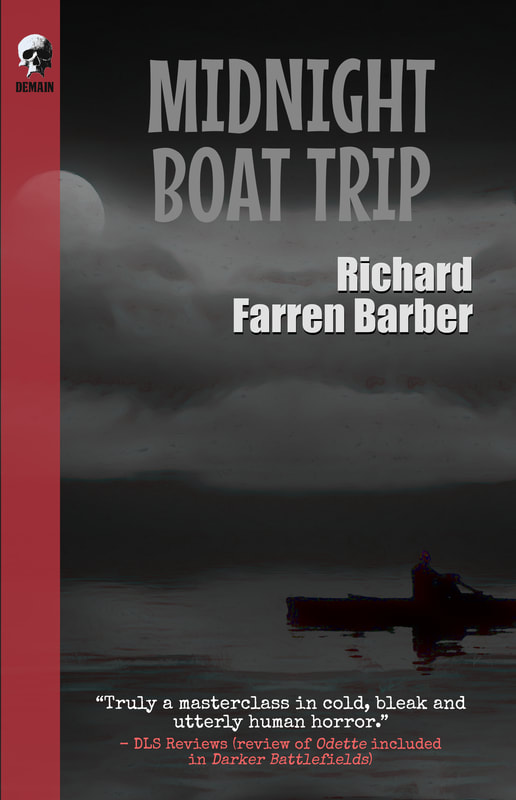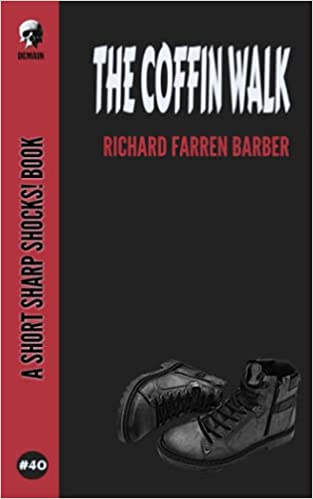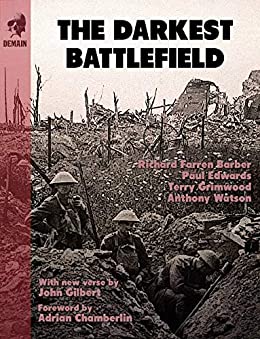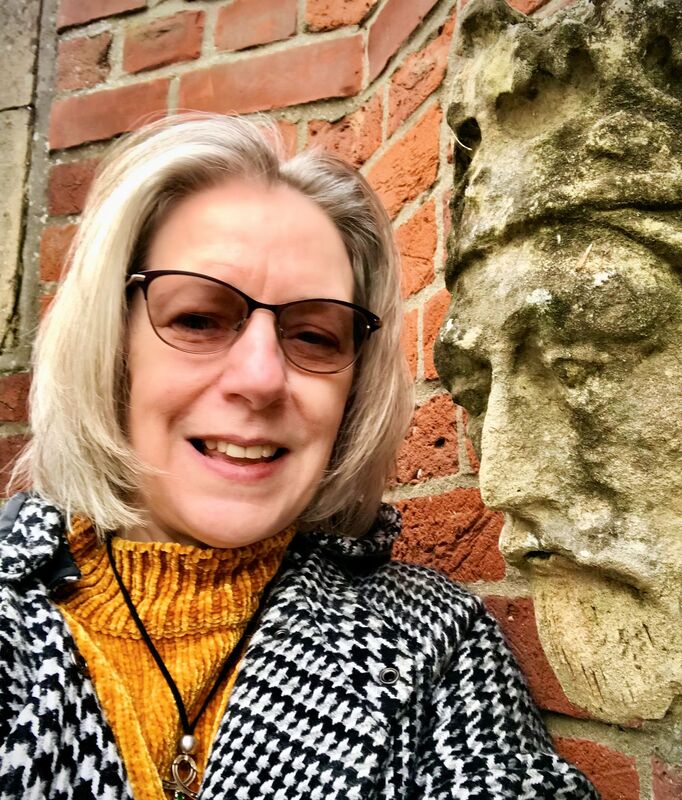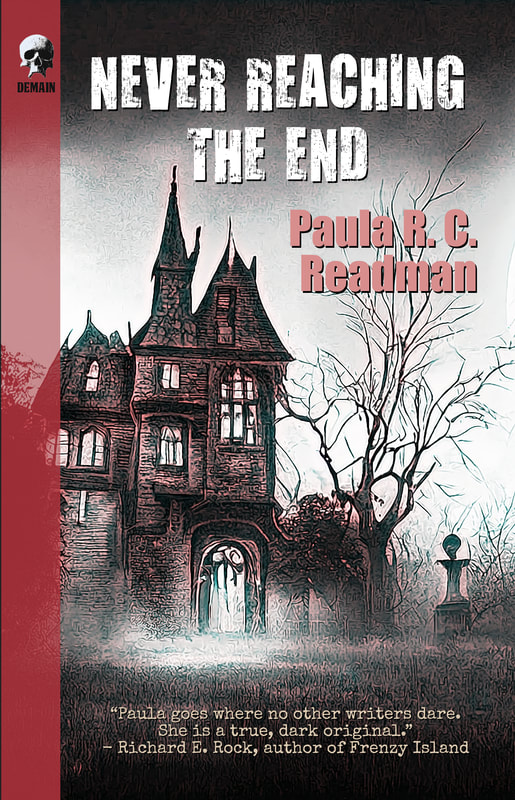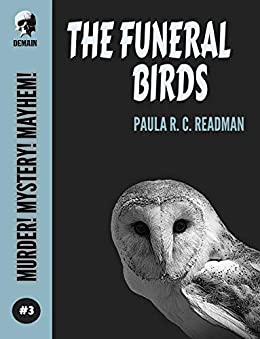|
|
|
April 28th sees the publication of Richard Farren Barber’s new novella Midnight Boat Trip (cover by Adrian Baldwin). Richard has worked with DEMAIN previously (including the Short! Sharp! Shocks! The Coffin Walk) so it was a pleasure to sit down with him again and talk…
DEMAIN PUBLISHING: Hi Richard – great to speak to you once more. I know I’ve asked some of these questions before but let’s pretend we’ve never met: can you tell us a bit about yourself and why you became a writer… RICHARD FARREN BARBER: Of course (and great to speak to you too). I’m Richard. I grew up with a love of books; I have a clear memory from primary school where we would walk down to the local public library in Hyson Green, Nottingham (A fantastic old Victorian building) to be allowed to pick/return books. I can even remember picking up my first Doctor Who book there (I don’t remember the exact title, but it was by Terence Dicks and it starred the Daleks) and then ploughing through the series. And I suppose that’s why I became a writer; because I loved reading. I loved pouring myself into a book and entering a different world. I see writing as an extension of that experience. When I’m writing I am immersed in the story and that thrill of the first draft, where I’m watching the story unfold at my fingertips, is intoxicating. DP: Definitely agree with that. So what’s your background and do you think that has had some influence on you as a creative ? RFB: I’m second generation Irish, which I do think has an influence. As a kid we went back “home” every second year and now I go back to Ireland most years. I think the mix of rural and urban and the mythology and sense of place and connection is something which crops up in my writing; either directly in the case of some of my stories which are set in Ireland, or indirectly in terms of the sense of spirituality. DP: I’ve never been to Ireland but an opportunity is presenting itself as we speak [I’m working on a film project with an actor from Kerry], so I’m hoping that this year I can get over there…what would you say was your first introduction to the horror genre ? RFB I suspect I share a kinship with a lot of UK readers who grew up in the 70s/80s: Doctor Who and Robert Westall. I had to read The Machine Gunners by Robert Westall in English class when I was about 12 and after that I just devoured everything I could get by him. Highlights included The Devil on the Road, The Scarecrows, and Futuretrack 5; which is up there in my favourite books. After that I took a detour into Pan and Fontana horror collections, but I don’t think I really read a “proper” horror novel written for adults until I was at university and picked up Stephen King’s The Dead Zone. After that I spent a year or two trawling the bookstalls of London trying to find cheap second hand copies of anything and everything. DP: And your novella… RFB: Midnight Boat Trip has a slight nod in the title to Clive Barker’s Midnight Meat Train, but that’s the end of any connection. A trio of children sneak out of their holiday home to take a boat onto the lake at night for an adventure. After the typical sibling arguments, the family finally comes together when they hear someone knocking on the underside of their boat. Although unnamed, the setting is Canada and the story has its origin in a family holiday to the Rockies. We stayed in a lodge beside a lake (Not Pyramid Lake, though!) There were elk wandering between the houses and we spotted a bear on the road up from the site. It was wild, in the true sense of the word. The tale itself is based on two ideas which clashed together and went off somewhere new. The first was the boat trip across the lake, which did happen, including our family arguing about how you were supposed to row a boat. The second was a story I read in the site’s reception that the nearby lake had been used by the military in the second world war. There was a secret project to build aircraft carriers using a mixture of woodpulp and ice, and they tested it on the lake. The project was not a roaring success, which you might have been able to work out from the fact the last ferry you took probably did not look like a length of sweaty MDF. The prototype sank. Switch boat to plane, and the suggestion that there was something under the water, and I was off! DP: That premise (or perhaps that should be those premises) is a real hook. I personally enjoyed reading the story so well done. So I’m assuming you had to do a lot of research ? RFB: I’m very bad at research. Or I research badly…I’m not sure which. In truth, I worry I’ll get so bogged down in finding out the facts that I won’t find room for fiction. So…I tend to write and then do very targeted research to try and ensure anything which needs to be accurate, is accurate. I suspect that my very strategic research is probably guilty of generating all manner of inaccuracies in my stories, and I apologise to anyone and everyone who has read something and felt a pang of physical pain when they spot something wrong. DP: And creatively what would you say was your biggest success to date ? RFB: I think in terms of my most successful piece of writing, ever, based on the number of readers, it would have to be the name and tag line I came up with for my brother’s window repair company: Assprin – For all your window panes. But that feels a bit sad, really. So in terms of my fictional writing, it’s probably the last novella I had published, by Crystal Lake Publishing: Twenty Years Dead. Dave returns to his father’s grave to witness his Rising exactly twenty years after he died. That one sold reasonably well, and I was happy with how it came out. I’m currently juggling half-a-dozen different projects (I know, I really ought to focus!) and a few of them are particularly dear to me. DP: I read Twenty Years Dead and really enjoyed it so well done and to be honest I love that tagline and it made me chuckle ! And there’s nothing wrong with juggling projects in my opinion – you should see my ‘writing board’ full of stories, novellas, scripts which need completing – the life of a writer hey ! Tell us about the books/authors that you like and/or influence you ? RFB: I tend to read across the piece; horror, science fiction, fantasy, crime, thriller, literary fiction. In a quiet moment last year I worked out that if I didn’t buy any more books, the unread books already on my Kindle would last me through the next ten years. Reader, I have bought more books since then! In terms of authors, my “go to” list is Stephen King, John Steinbeck and Robert Westall, but there is a great wealth of talent both inside the horror genre and beyond. Names that spring to mind include Ramsey Campbell, Michelle Paver, Adam Nevill, Neil Gaiman, Paul Tremblay and Sarah Pinborough (The Death House is awesome!!!). But there are just so many great stories out there. As well as the mainstream I read a lot of Independent Press with authors such as Simon Bestwick, Peter Mark May, Mark West, Mercedes M. Yardley, and Dave Jeffery. I would really need to pull up my list of books read from Goodreads to give a proper account of my reading habits, I’ve missed a large number of great authors (even as I’m saying this more names are popping to mind, but I could spend much of the day creating a list!) In terms of influence, I think everyone is influenced to some degree by what they read. My early writing read like very bad Stephen King, but hopefully I’ve got beyond that. Sometimes I will be reading something and notice the impact it’s on me having and try to work out what the writer is doing to achieve that effect. Sometimes I’ll spot a particular trick and consider whether I can (and should) incorporate it into something I’m writing. Perhaps the most direct influence, though, is when I read something and it sets off an image or an idea in my head. The author usually goes in a different direction but the idea stays with me like a seed waiting to germinate. Perfect Darkness, Perfect Silence came about in that way. It was from a single image in a Tim Lebbon novel in which someone was dumping a body overboard. DP: That’s great that you (like me) can be influenced by a simple single image – I love the way the brain (and creativity) works – it’s such a blessing. What would you say horror means to you ? RFB: I have two answers! Firstly, horror is an emotion. It’s a visceral response to what is usually a sense of danger. But for me as an art form (and there’s a danger I’ll trip over into pretension here, so hold onto my hand and haul me back if I go too far) horror is able to reflect on the core questions of humanity: why are we here? What is important to us? Is there anything else? I love the fact that in a horror novel you can be dealing with the surface of “the monster” but then you can peel back to what that means for the characters and by extension, what it means for us as individuals. DP: So true and very profound – love it. With this in mind then what do you think draws readers into the genre… RFB: For me, horror offers something which no other genre really touches: What is life all about? What happens next? A lot of horror deals with the interface between life and death and the possibility of moving between those two worlds. I think horror fiction gives you the thrill and the jolt, but personally I think a great horror novel leaves something behind once the reader has finished. A suggestion. A hint. The possibility that it might not all be over when the nails are hammered into the coffin lid. DP: Which to some extent I believe we’re all hoping for. Thinking about what you’ve said would you agree that the horror genre is affected by world events… RFB: There’s a school of thought that when real life is dire, people turn to horror fiction as a way to process the horror. I’m not convinced by the theory, otherwise the horror genre would be permanently booming. In terms of adding world events into my stories, I do tend to drop in occasional references to events. Most recently I was considering what to do about the Covid-19 pandemic. It felt strange just to ignore it, but also I think there’s a real sensitivity when you’re dealing with history, and especially recent history in which millions of people died. DP: It’s slightly weird as we were expecting a glut of Covid related subs at DEMAIN but that hasn’t happened – I guess it is still raw for a lot of people. Is there a new writer (or director) that currently interests you ? RFB: I think one of the challenges with naming new writers is that in many cases, by the time they are reasonably successful they’re not new... they’ve been honing their craft for years. So I’m going to sidestep that particular conundrum and go for two writers who are reasonably new to me: Chuck Wendig and Grady Hendrix. See what I mean? Chuck’s debut novel came out 12 years ago while Grady’s Horrorstor in 9 years old. Not exactly Jordan Knight and Mark Wahlberg then! DP: Haha love the comparisons there. Going back a second (thinking about something you said) do you think the horror genre is dead ? RFB: I think I’ve been reading for the last few decades that the horror genre is dead. Followed by reports that it’s going to be the next big thing. I think firstly, there are two genres: there is horror film, and there is horror literature. I think they are very different beasts. Unless you start hiding springs in books it’s difficult to get the visceral jump scares you can achieve within a film. As a result I think books within the horror genre tend to take a different path and look to achieve different emotions in the reader. Do I think they’re dead? No. I think their popularity dips and grows, and I suspect we’ll never see horror fiction reaching the same levels of public acceptance and interest as the seventies and early eighties, but you only have to look at the success of Stranger Things, Squid Game and The Last of Us. DP: You’re right and perhaps that’s my mistake to mix both film and literature up there. Oddly I’ve just been reading an article about Horror in Hollywood and apparently producers are screaming for new horror scripts…so it does seem that in film at least there’s another boom on the horizon. Okay, so what scares Richard Farren Barber ? RFB: I’m not sure afraid is the right description, but I find ghosts fascinating. When you look at all the tropes within horror; vampires, zombies, etc I find myself most attracted to ghost stories. I love what they represent, and the potential they have to explore so many emotions. DP: And creatively is there something you haven’t yet done… RFB: I’m currently working on a series of connected horror novellas with the same central character, and also a series of crime novels with (a different) same pair of lead characters. So I would say I’ve never had a sequel or a series published, but I’m working to address that! DP: Excellent. And therefore I’d say that writing is a long term career for you. RFB: I think if I were to describe it as a career I’d have to wait for a lot of people to stop laughing before I carried on speaking. So let’s call it an endeavour. I definitely think I’m here for the long haul. (35 years and counting…) DP: Well done you and that’s a success in itself as so many talented people just give up at the first hurdle…two more questions to go ! And fun ones too. First, do you interact with your readers and have you got any funny stories… RFB: I do if I can find them! My Facebook friends are split into three categories: family, people I have met through work, and readers/writers within the speculative fiction community. After quite a long gap, I ran a writers’ workshop (on horror) again a few months ago and absolutely loved it. It is the same sort of joy which comes from attending Cons – where you spend hours talking to people about books, and books, and occasionally films, but then more books. Funny stories? I did once have someone critique one of my novellas to me when I was in a public toilet. That was…disconcerting. For my own part, I’m very quiet and reserved so I’m not great at going up to authors I admire but don’t know and telling them how much I enjoy their work. The most significant departure from that behaviour was when I saw Graham Masterton and forced myself to tell him that he had written the only book which scared me so much I couldn’t go to sleep (The Djinn). DP: I love The Djinn and it’s been a while since we’ve done any Cons but definitely looking to get to a couple this year – if not filming. Okay, okay, last one (promise !): What is something your readers might be surprised to find out about you ? RFB: This is a slightly high-risk strategy as any number of people might simply say “well that explains a lot”, but… I failed O Level English Language and English Literature. I passed both on my resits, but that doesn’t really erase the first attempt. And they were the only two O levels I failed. DP: Wow that does surprise me but excellent that you passed in the end (we won’t talk about driving tests as I passed eventually but it took a few goes hahaha). Thank you so much for your time, enjoyed talking with you again and the best of luck with Midnight Boat Trip. If you would like to connect with Richard direct: Website: www.richardfarrenbarber.co.uk Twitter: https://twitter.com/rfarrenbarber Facebook: https://www.facebook.com/richardfarrenbarber
0 Comments
April 28th sees the publication of Paula R.C. Readman’s novella Never Reaching The End (cover by Adrian Baldwin). This is her second DEMAIN release, following on from her Murder! Mystery! Mayhem! title, The Funeral Birds. Prior to publication Dean and Paula had a good old natter.
DEMAIN PUBLISHING: Hi again Paula, hope life isn’t treating you too badly. Great to be working with you again, so let’s get down to it – for those that don’t yet know you could you tell us a little about yourself and why you became a writer. PAULA R.C. READMAN: Hi! How do I make myself sound interesting on the outside when all I have to offer is a dark mind? I left school poorly educated and worked in factories, got married, and had a son. The first marriage broke down so I went back to work to support my son and myself, met a wonderful man and married ten years later. My husband allowed me to focus full-time on my writing when redundancy happened to me for the third time in my working life. For about 20 years, I’ve been writing to be published and started, as most writers do by writing a novel. I soon learnt that wasn't the best way to start, and set the rejected books to one side and began writing short stories. Once these began to be published, I went back to novel writing. In 2020, DEMAIN Publishing published my first book, The Funeral Birds. DP: Indeed we did and we had great fun doing it. Let’s talk about your background… PRCR: My first love has always been art, and became the inspiration to write Stone Angels. The book tells the story of an artist called James Ravencroft. I wanted to get into Art College, but my lack of education meant I failed the entry exam. Evening classes were too expensive for me, so I borrowed library books. That's when I fell in love with the Pre-Raphaelite artists and their stunning paintings. Each picture tells stories if you understand the symbolism in them. Reading about the artists and their lives led me to research the authors and poets of the Victorian era, as many of the Pre-Raphaelite artists found inspiration from poems and literature. DP: That’s very interesting. I’ve also wanted to do an art history course, you’ve inspired me to do it now. So what was your first introduction to the horror genre? PRCR: I’ve been fascinated with the dark side from a small child. I’m named after a dead brother called Paul. I saw children in our house that weren’t there. When I asked my older brother, Mark about them, he said we were the only children there. When I told my grandmother about them, she told me not to repeat what I had said to anyone, so I didn’t. In my junior school, a group of children used to play a game where they could lift another child with their little fingers. ‘This is the Power of Levitation. Sound and silence must not be broken. She looks ill, she is ill she looks dead, she is dead,’ was sung by each person in the circle, and then together, we would lift the girl above our heads. I had an Ouija board until my mother burnt it. This led me to read anything to do with the supernatural, including fiction, like Stephen King, and the Tales of the Unexpected, written by Roald Dahl in the local library. I’m more of a Gothic Horror lover than blood and gore. DP: Fascinating! I don’t think I knew that about you – wow. Okay, I’m a little bit scared now (in a good way I think!). Let’s move on to your novella… PRCR: Never Reaching the End is meant to be part of a three-book horror submission to an Australian publisher I'd worked with previously. They were doing a call-out for a series of horror books and wanted a short story for three themes, House, Ship, and Space. I missed the deadline because I was busy editing a novel. An American anthology accepted my space tale. I still have the ship story on my computer. Never Reaching the End is my take on the haunted house storyline. DP: Interesting and happy for us that you did miss your deadline! What would you say was your biggest creative success thus far? PRCR: The Funeral Birds, I think as was unexpected. I originally wrote it for a BBC short story competition but wasn't successful. My neighbour Joan kept pushing me to resubmit it to other places. It was only when Alyson Faye contacted me to say that DEMAIN was doing a call-out for crime I submitted to you. The Funeral Birds, with my other four books, are now available in libraries in Essex. DP: Yes Alyson did recommend you highly. I’m happy that other publishers have been working with you and recognising your talent – well done. What books/authors do you read and are they an influence? PRCR: I read an eclectic collection of genres and authors from Victorian writers to Agatha Christie and beyond. The one thing I look for in all books is a twist in a tale, and something that I wasn’t expecting. At my age, I have been reading regularly all my life. I loved Anne Rice's Interview with a Vampire, and Flowers in an Attic by V.C. Andrews for their originality. The Ghosts of Thorwald Place by Helen Power is one of the best books I've read lately. DP: I love Anne Rice’s work – haven’t heard of Helen’s book but will check that out asap. So, what scares Paula… PRCR: Three things that horrify me the most are rats, the thought of being buried alive, and handling sheets of glass, which makes me feel sick. As for rats, I grew up next to a flour mill. My father was a master miller and explained the importance of keeping the mill clean because if the rats' droppings or urine got into the flour, it would be unfit for human consumption. As a child, I learnt about the link between the Black Death and rats, which added to my fear of them. We lived in an old cottage; I could hear rats crawling in the walls as a child. So far, I haven’t written about glass, rats or being buried alive, but thinking about them, helps with describing the emotion of fear or panic. DP: Oh my Lord – you’ve definitely got to write that book!!!! Which leads me onto: creatively is there anything you’d like to do but haven’t done yet? PRCR: I would love my books to appear on bestselling lists and in shops, but all writers hope for this too. I’m working hard to make it happen, so fingers crossed. I’m busy creating the first novel in a series of books. It is still in the plotting stage, so I want to take it one book at a time and see how it develops. I’m not very good at working under pressure. I tend to panic, which isn’t helpful and stops my mind from developing new ideas. DP: So writing is definitely your long-term career? PRCR: I've always planned for my writing to be a long-term career. Will I always write horror, I'm not sure. I might run out of ideas that excite me enough to continue writing in this genre. I don’t see myself writing romance any time soon. As I've said in a previous question, I'm working on writing a series of supernatural crime books. I have plenty of ideas, but until I've completed the foundations in the first one, and made the leaps in time believable in my mind, I can’t begin writing the rest. DP: Great to hear – keep at it for sure! So final question, what is something your readers might be surprised to find out about you? PRCR: I have a motorbike licence. I was a bit of a wild child in my youth. I love the natural world and enjoy photographing fungi, graveyards, and churches, and I have Viking blood in my veins. I can’t watch X-rated movies because they scared me, too. And on that note – thank you Paula, the best of luck with Never Reaching The End. If you’d like to connect with Paula direct: Blog: https://paularcreadmanauthor.blog Facebook: https://facebook.com/paula.readman.1 Twitter: Paula R C Readman@Darkfantasy13 Amazon Author’s Page: https://www.amazon.co.uk/Paula-R-C-Readman/e/B00A9UHMSO |
CategoriesArchives
July 2024
AuthorDean M. Drinkel |
